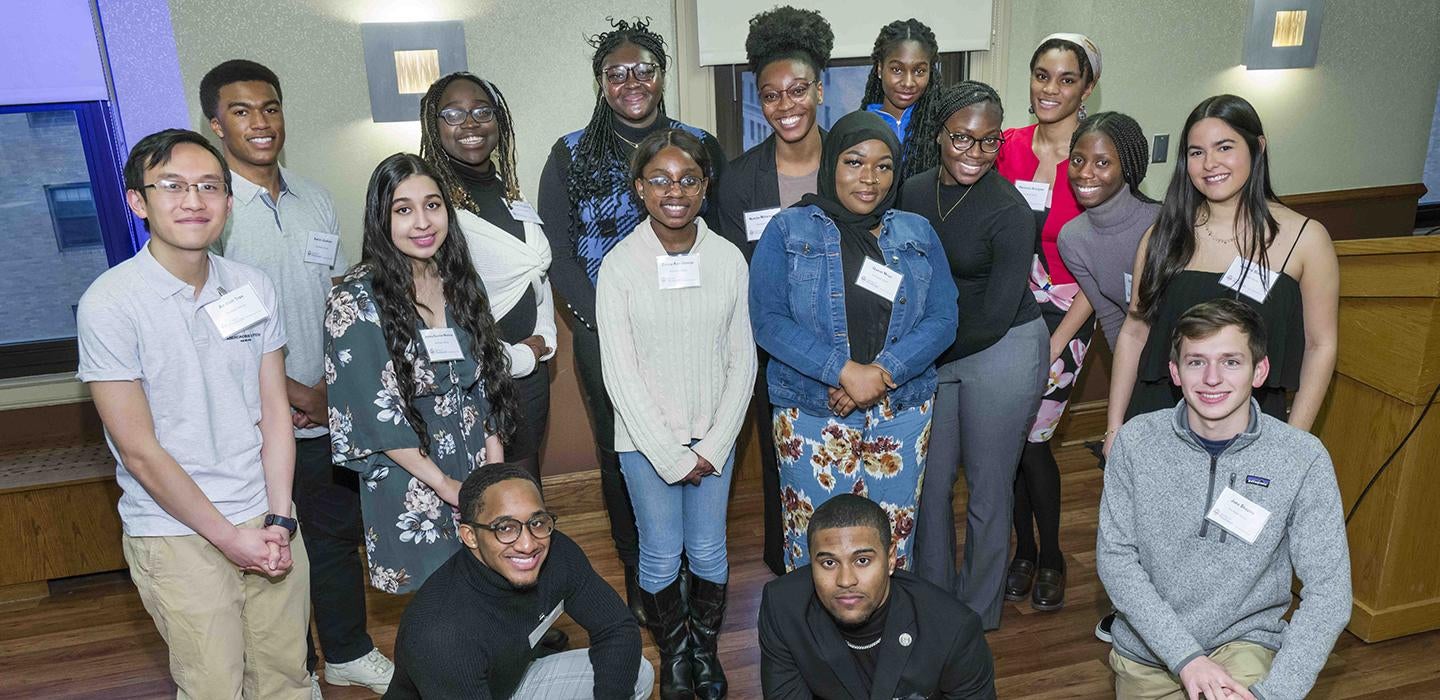
Subscribe to Pittwire Today
Get the most interesting and important stories from the University of Pittsburgh.Andrea Hergenroeder (EDUC ’09G) always envisioned the University of Pittsburgh as a foundational leader in developing a diverse national health care workforce. That plan began unfolding in 2021 with the receipt of Pitt Seed Grant for a project entitled “Building a Foundation of a Diverse Health Care Workforce.”
Susan Meyer, former School of Pharmacy associate dean for education and pharmacy and therapeutics professor emeritus, initiated the Pitt Seed application. Hergenroeder took over following Meyer’s retirement in 2021. With the help of Paula Davis, associate vice chancellor for diversity, equity and inclusion in the health sciences, and Joe McCarthy, vice provost for undergraduate studies, the project evolved into the Pre-Health Scholars Program — an undergraduate diversity initiative of Pitt’s Pre-Health Resource Center designed to ensure the success of underrepresented pre-health students through mentoring, advising and other targeted support.
“The main tenet of the program is to connect existing units at Pitt and develop new programs to build a community to support underrepresented minority pre-health students as they prepare for and apply to graduate professional programs.” said Hergenroeder, who is now director of the Pre-Health Resource Center and an associate professor in the Department of Community and Health Services and Rehabilitation Science. “To help eliminate healthcare disparities, [we must] diversify the workforce.”
A study published in 2021 found a disproportionate number of health disparities and diseases among Black, Latino and Native American populations. The report cited that “increasing transparency around the representation of these populations in healthcare professions could increase cultural competency among healthcare professionals and reduce health disparities.”
The first Pre-Health Scholar cohort welcomed 16 first-year and sophomore undergraduate students interested in pursuing medicine, dentistry, physical therapy and more. Hergenroeder said faculty across Pitt’s schools of the health sciences are invested in the initiative and their partnerships enabled students to be matched with a professor working in their desired fields.
In addition to panel presentations that featured Pitt and UPMC health care providers, the cohort also took field trips, including one to the Homewood Community Engagement Center (CEC) and Wellness Pavilion, where they learned about field-related community engagement opportunities.
Students not only expand their portfolios, but also get to explore different career paths, while receiving channeled support.
“I wanted to be a part of a group where I can relate to my peers and I found a place where I feel comfortable,” said Gamar Muya, a Kenya native majoring in biological science who was a first-year student when the program began. She currently works as a certified nursing assistant in a community for older adults with hopes of becoming an obstetrician/gynecologist.
Noting the emphasis on underrepresented students, Muya added, “Joining this program was the best decision I ever made.”
Monico Williams, now a junior from Downingtown, Pennsylvania, is majoring in architecture on the pre-med track. She sought out the program for a community she didn’t find anywhere else.
“As a first-generation college student, I don’t have a lot of family to guide me through the process or struggles I experience, so it’s imperative that I build my support system,” said Williams. “My family provides a great amount of support, but it’s beneficial to receive guidance from someone that’s been in your position.”
She commended the mentorship and networking as the program’s standout features.
“The engagement of mentors across the campus is an outstanding feature,” said Davis. “Hearing the stories of others who have gone before is an opportunity to learn in a very real way that no one is on an island in their health career preparation; it isn’t necessary to go it alone.”
Kathryn Reed (A&S ’14, ’16G) is a School of Health and Rehabilitation Sciences assistant professor who mentored Lisa Antwi, a pre-physician assistant student majoring in biological sciences and dual minoring in chemistry and French. Reed described last years’ experience with Antwi and of supporting the next generation of scientists as a “breath of fresh air.” She added, “Without this type of program acting as a conduit, these personalized experiences between faculty members and undergraduate students can be difficult to attain.”
Williams said the relationships the Pre-Health Scholars Program fosters have made all the difference.
“This program has not only driven my academic and professional careers but has also positively impacted my Pitt experience,” said Williams. “It provides an encouraging atmosphere that rejuvenates college burnout. The program promotes a supportive environment that allows members to flourish and succeed, recognizes their value and be the best they can be. It serves underrepresented groups and shows in its actions and events that this program values diversity.”
— Kara Henderson


